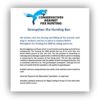 Written by Douglas Batchelor, the CEO of The League Against Cruel Sports. March 25th 2011
Written by Douglas Batchelor, the CEO of The League Against Cruel Sports. March 25th 2011
“In my blogpost last week I referred to the grooming of children to kill for fun. It evoked a storm of protest from the hunters and shooters. They really did not like being labelled with the language more commonly used for other perversions.
When you stop to think about it, a fascination with killing for sport is a very unhealthy fascination. What is it about taking a life from which killers derive such great satisfaction? What is it about chasing an animal with a pack of dogs that gives the killers pleasure? What is it about pitting one animal against another in a trial of strength, which gives the killers pleasure? The answer is that we don’t really know, because we are not of the same mind set as the killers.
The big question for society is what do we do about people with the killer mindset? Do we just put their predilection for killing down to their not being like the rest of us, or do we decide that such predilections are so fundamentally unhealthy that we must act in the interests of the killers own welfare and of the welfare of those threatened by their predilections?
The people with the killer mindset are of course outraged that we, the majority, consider their perverse interests in animal abuse as being mentally unhealthy. They are mortified by the fact that the vast majority in society judge them to be ‘not of sound mind’ in their attitude to killing for sport, and are very upset that we judge them to be criminal when they act in the pursuit of their predilections.
The League Against Cruel Sports believes that it is right to address the problem of the mental health and the welfare of the people with the killer mindset. We believe that Parliament was right to make it a crime to chase and to kill for sport. We believe that it was right to take away the freedom to be cruel for sport and to constrain the activities of cock fighters, bear and bull baiters. We believe that it was right to make crimes of badger baiting and dog fighting.
When the cruelty happens on our own doorsteps and is carried out by people like us who we know, we find it difficult to challenge. Hunting and shooting for sport are particularly difficult because for the most part they are carried out by people who are in most other respects law abiding and reasonable people. We have less difficulty condemning terriermen and or dog fighters some of whom are also involved in the drugs trade, because they for the most part are not like us.
One of the things that cause the most confusion in people’s minds about the criminality of animal abuse for sport is the mixture of people involved in hunting and shooting for sport. At one end of the spectrum of involvement you have the bystanders, generally pretty remote from the action and at the other extreme you have the people who are closely involved in the chasing and the killing. There is no doubt that those closest to the action are the most coarsened in their sensibilities and are the most damaged by their involvement and their predilection to chase and kill for sport.
In the shooting industry the same difficulties and degrees of involvement exist. On the one hand you have the gamekeepers whose employers expect them to trap and to kill on a daily basis and at the other extreme you have the people who simply go along as spectators and who take no part in the shooting and killing. Again there is no doubt that those who are the most actively involved are the ones whose sensibilities are the most coarsened and who are the most damaged by their involvement.
At issue is we help the people most damaged and coarsened by their involvement in and their exposure to cruelty and abuse of animals for sport? By the time they have been coarsened by their continual exposure to cruelty and abuse, they certainly don’t want our help. In fact they want us to stop challenging their behaviour.
When you look at who gets charged with breaking the law, it is the huntsmen, the terriermen, the gamekeepers and the hare coursers; the very people who get closest to the killing and who regularly appear in court. The hunt masters, the estate owners and others who employ these people don’t seem to care that the people who work for them are clearly being damaged by the work that they are being asked to do. The damage is insidious, the mental health and welfare of those employed to chase, shoot, trap and kill is not easily measured other than by their criminal actions.
What is perhaps more frightening and concerning is how the damaged people act in our society. They break the law, they are cruel to animals, and all too often, their cruelty and abuse does not stop there. Criminal profiling suggests that people who abuse animals are also more likely to abuse people as well. We know of the criminal records of some of them. We see the violence and the intimidation they mete out to people who object to what they do, we hear reports of their thuggish behaviour and we get reports from family members that bear testament to the domestic violence and bullying that is so often associated with those who are routinely cruel in their work and sport. Indeed, there is so much evidence to this effect that we published a book of it following our conference at Oxford University a few years ago.
This all provides good reasons for tackling the behaviour of those who are cruel to animals for sport. It isn’t just the animals that are their targets that suffer; it is the many other victims of the cruel people and the people themselves, who all suffer as a result of the continued exposure to cruelty that is a direct consequence of their employment and of their leisure pursuits.
The hunters and the shooters like to talk about their sports in terms of their targets. The hare needed to be shot, the deer and the fox was a pest and so on it goes. Somehow in their view the live target deserved their crime. They try to present what they do as if it was some sort of sad necessity. They seek to convince us that they are in some weird way acting responsibly and are not, as we believe, damaged people.
So next time you engage with a supporter of cruelty to animals for sport, ask yourself, how deeply damaged is this person? How much have their sensibilities been coarsened by their prolonged exposure to cruelty? Ask yourself the most fundamental question: can they be trusted?
It is a sad fact that people abused as children are much more likely to become abusers as adults. That is yet another reason why we should be concerned about groups of adults who abuse their children by grooming them to kill for fun. Grooming little killers is not just irresponsible; it is symptomatic of an abusive background being one of the drivers of those people exhibiting that sort of behaviour. It is high time we made it a crime to train a child to kill for sport and to halt this endless cycle of teaching children that killing is good fun.”






